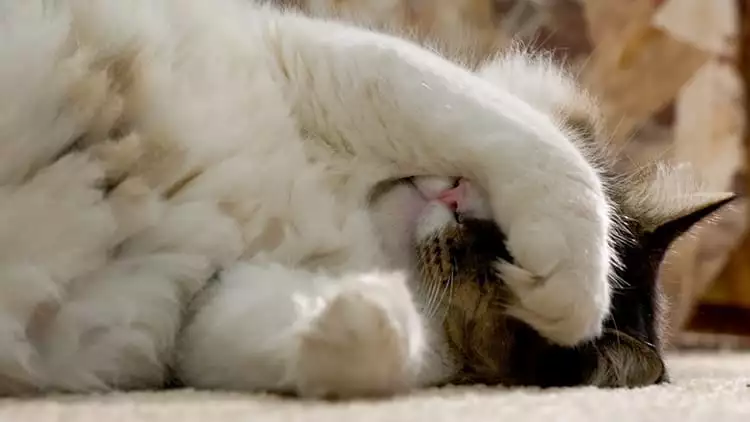Now and then it is not unusual for a cat to vomit. Like people, they can have upset stomachs for many reasons, including stomach bugs, a reaction to a food that does not agree with their stomach, and even serious illnesses.
It is important to understand that vomiting is not normal in cats, especially if it is happening more frequently than once a month, or it is happening repeatedly. If this is the case, it is time to seek help from a veterinarian to get to the cause of your cat’s stomach issues.
Vomiting Or Regurgitation?
When it comes to getting help from your veterinarian, one thing they may want to know is whether your cat is vomiting or regurgitating. Here is the difference.
Vomiting
If your cat is truly vomiting, you will likely notice them retching, drooling, or making other noises before the contents of their stomach are expelled. Vomit may include food, water, or bile, all from the stomach.
Regurgitation
If your cat has eaten and you see whole pieces of food in the projectile, it may be regurgitation. When this happens, the food, water, or other object ingested have not made it to the stomach before they come back up. There is usually no retching associated with regurgitation, either.

What Could Be Causing My Cat To Vomit?
Here are a few possible causes of a cat’s vomiting.
Eating Too Much, Too Fast
If your cat is a fast eater, you can almost be sure that sooner or later then are going to end up throwing up. You can slow your cat down during mealtime by feeding them from a puzzle bowl or feeding toys.
Not only do these types of products keep your cat from eating too fast, but also make mealtime fun and engaging. If you have slowed down your cat’s eating and they are still vomiting, a visit to your veterinarian is necessary.
Food Allergies
If eating too much, or too fast is not the cause of your cat’s vomiting, it might be a good idea to take a close look at the food you are feeding to them. Some cats have food allergies, and certain stomach sensitivities.
If your veterinarian believes that your cat’s food is the problem, they may suggest changing up your cat’s diet with a food that will not irritate their sensitivities. If that does not work, a stricter diet, also known as a hydrolyzed diet, might be recommended.
Hydrolyzed Diet
A hydrolyzed diet means that the food has gone through a process to break down the protein, which is the cause of many food allergies in cats. The breakdown keeps your cat’s immune systems from recognizing the allergen, which then prevents any allergy symptoms or flare-ups.
Hairballs
It is not unusual for a cat to occasionally pass a hairball. However, if it is frequent, painful, or difficult for your cat to get out, there may be a more serious issue. Hairballs happen because cats are diligent with their hygiene. As they groom, cat’s tongues catch loose, or dead hair, and then swallows them. Often, theses hairs will pass straight through your cat’s digestive system, but sometimes they become trapped in the stomach.
There, they can form a ball – the hairball – which then is vomited. There are some things you can do to prevent hairballs from forming. Several supplements can be bought in chew or gel form.
Regularly brushing your cat’s fur can also prevent them from swallowing the hair they might have ingested while grooming themselves.
Changing Diets
Routine, especially around mealtime, is important for cats. If you are unsure of how much and how often your cat should be eating, talk to your veterinarian. When there are changes to your cat’s diet, it can cause your cat to vomit or regurgitate the food.
If you are switching up your cat’s food, be sure to do it gradually. Over the course of at least one week, gradually decrease the amount of the current food you are giving your cat, while introducing more and more of the new food.
Gastritis
Cats can be curious creatures, and that is no different when it comes to when they put in their mouths. Many times, cats get into something they should not have, which can irritate the lining of the stomach. It is a condition known as gastritis and can cause your cat to vomit or regurgitate their food, and in some cases blood and bile.
Along with vomiting, you may also notice a change in your cat’s appetite, attitude, or activity level. They may also seem dehydrated. Other causes of gastritis could be constipation, throat irritation, parasites, or an obstruction in the digestive tract.
Cat Vomiting Symptoms
Ongoing issues with vomiting could indicate that your cat is seriously ill and needs you to contact a veterinarian as soon as possible. You should also contact a veterinary professional and seek help if you see any of the following symptoms:
- Repeated vomiting
- Blood in vomit
- Weakness / Lethargy
- Pain / Distress
- Fever
- Blood in stool
When you do make your visit to the vet, make sure to also take a sample of your cat’s vomit with you to the appointment. Being able to see and physically examine it may help to determine the cause of your cat’s stomach issues. Some of the things that a veterinarian can determine from a sample of your cat’s vomit include:
- If there are large amounts of mucus on the vomit, it could be a sign of inflammation in the intestine
- Seeing undigested food could indicate your cat has ingested something toxic, they have anxiety, or they have simply eaten too much too quickly
- Bile in the vomit could mean there are underlying conditions, such as pancreatitis or inflammatory bowel disease
- If you see red blood in the vomit, it could be your cat has ulcers
- If there is a strong smell present, it could mean there is an obstruction in the intestines
Call Your Veterinarian
Your cat’s medical treatment will be dependent on the underlying cause. Some issues can be fixed by temporarily fasting your cat or could be serious enough to warrant surgery and other procedures.
Work with your Northern Pike Veterinary Hospital veterinarian by calling 412-373-8580 to determine the best course of action.

